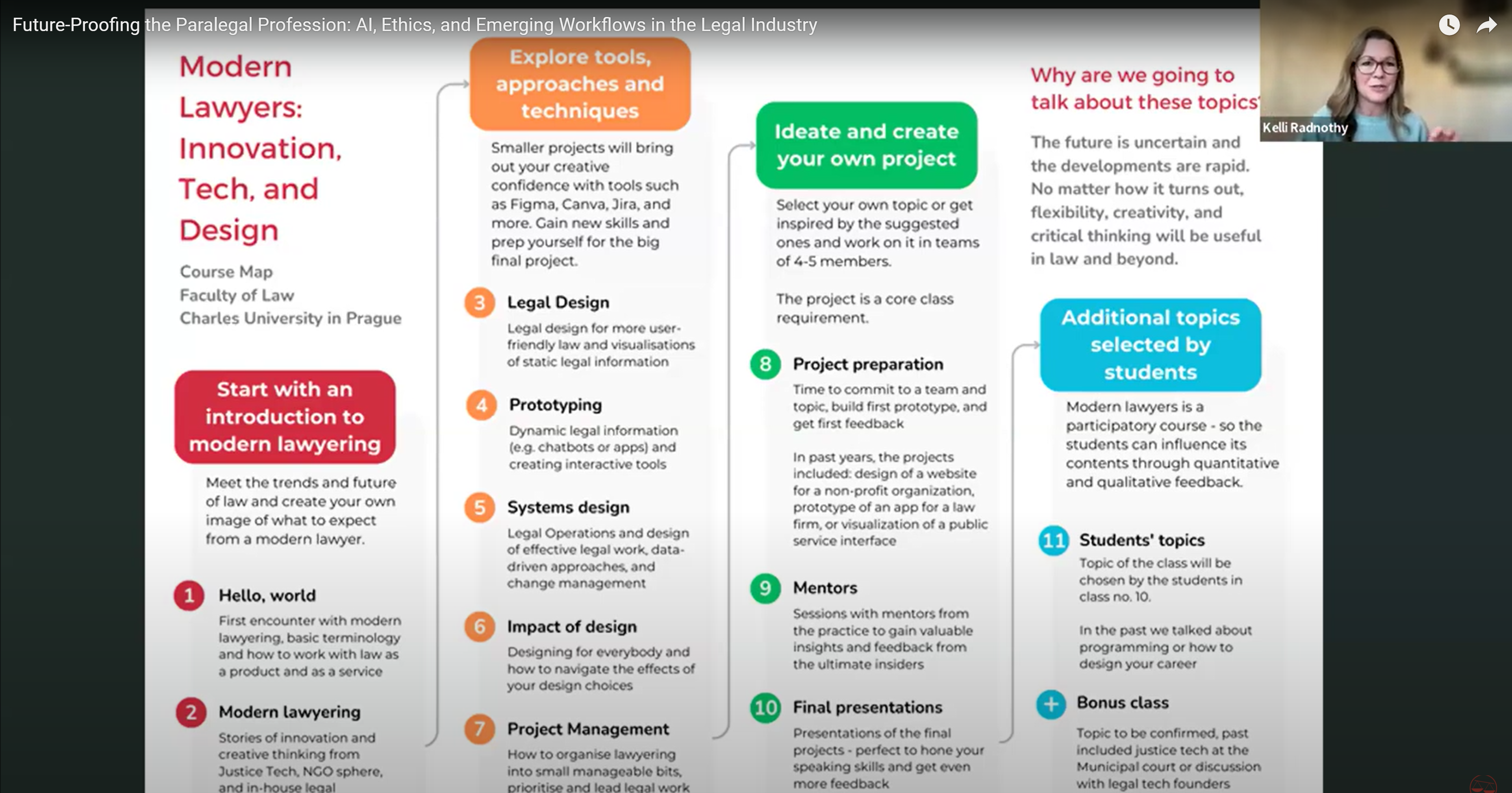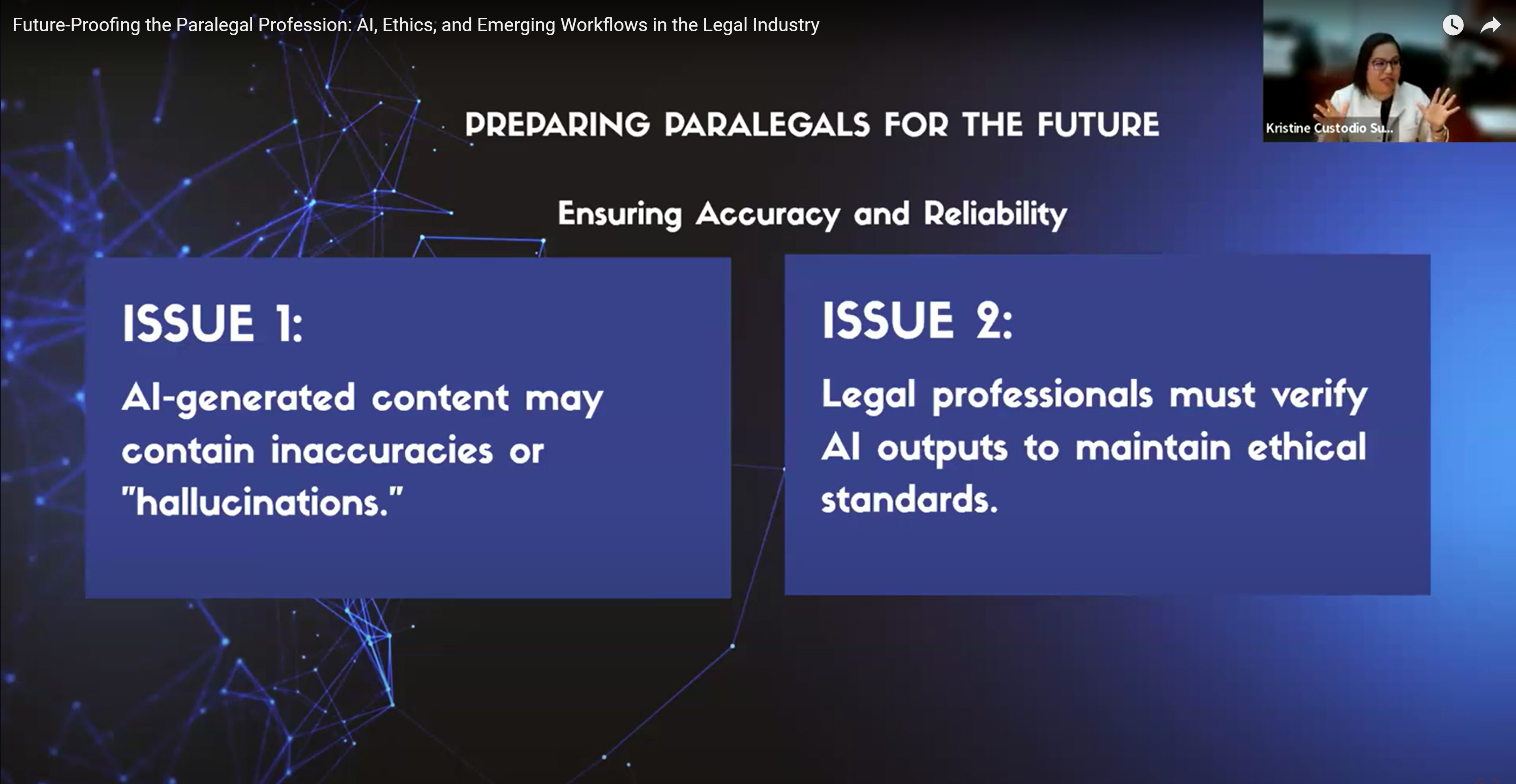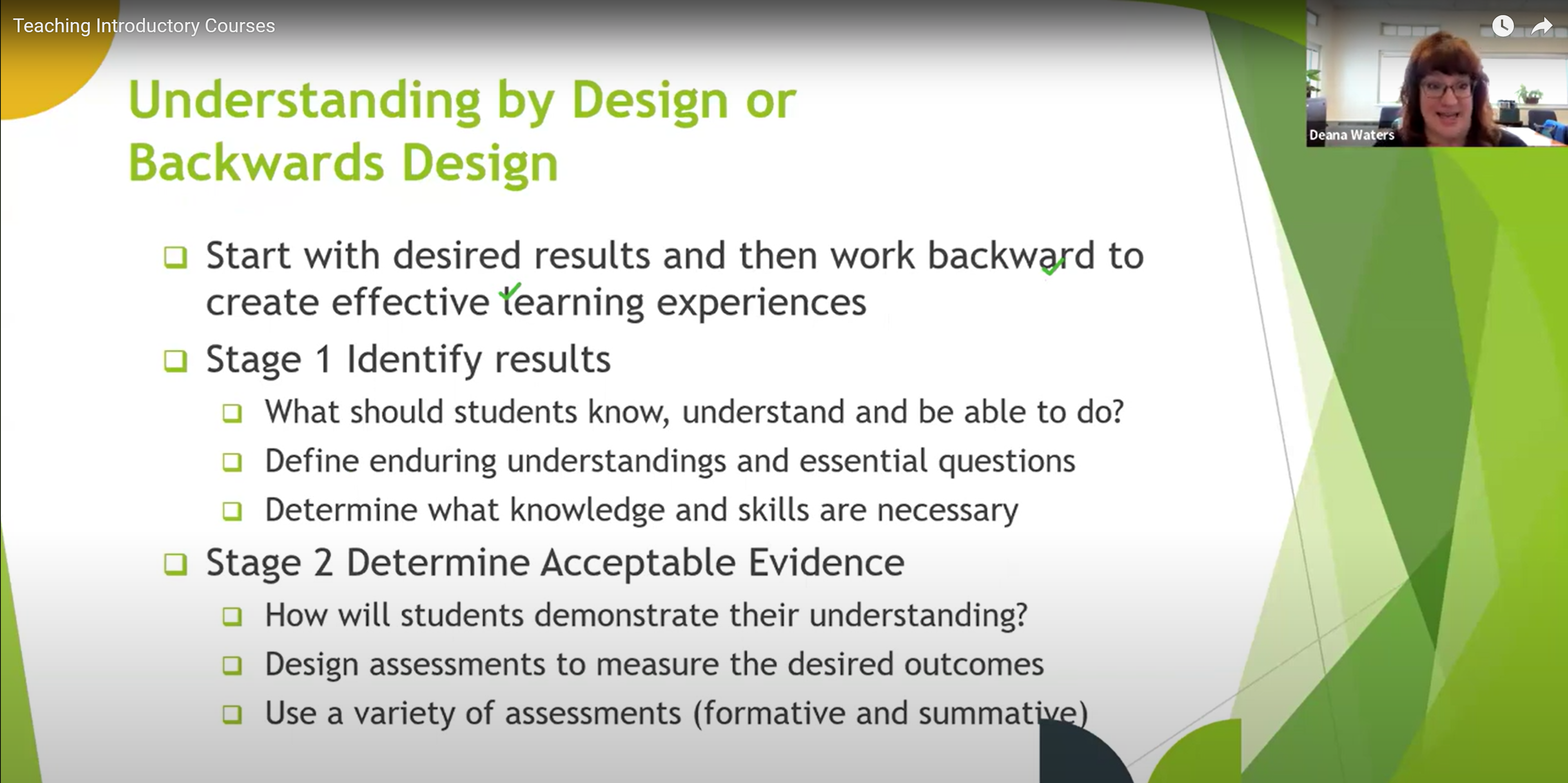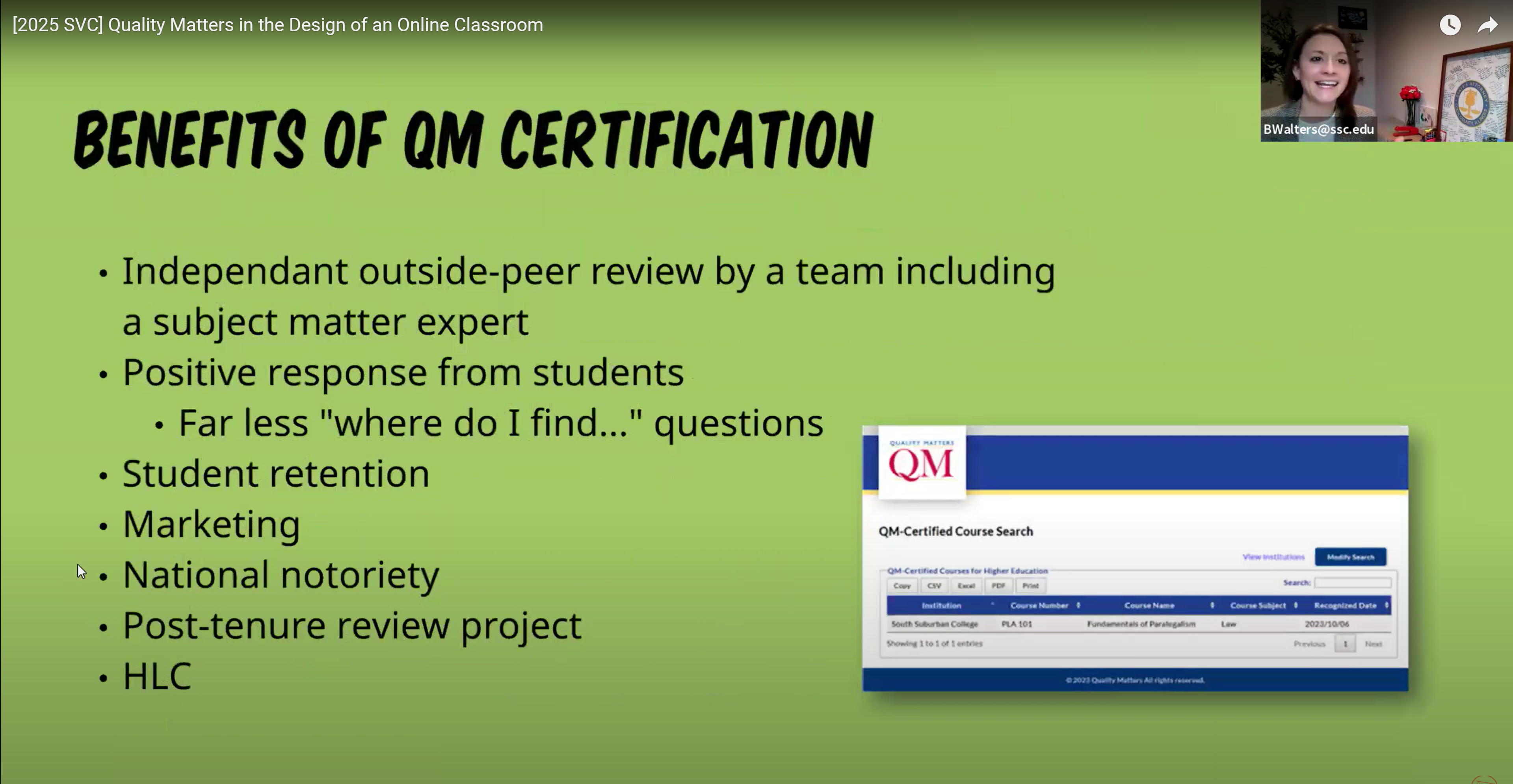The first day of AAFPE's Virtual Conference featured five engaging sessions, with three eligible for the AAFPE Badge micro-credentialing track. Attendees from across the country gathered virtually to explore innovative approaches to paralegal education that are transforming how we prepare the next generation of legal professionals.
FUTURE OF THE PROFESSION
AI Won't Replace Paralegals, But Paralegals Who Use AI Will Replace Those Who Don't
Navigating Ethics and Emerging Workflows in the Age of Artificial Intelligence
Kelli Radnothy shares insights on AI's transformative impact on paralegal practice.
The first day of the AAFPE Virtual Conference kicked off with a powerful message about the future of the paralegal profession in the age of artificial intelligence. In the opening session, "Future-proofing the Paralegal Profession: Navigating AI Ethics and Emerging Workflows," presenters Kelli Radnothy and Kristine Custodio Suero challenged attendees to embrace technological change while maintaining critical thinking skills.
Drawing insights from the Future of Jobs Report 2025 by the World Economic Forum, the session emphasized that AI should be viewed as an assistive tool rather than a replacement for human expertise. When polled about their AI literacy on a scale of 1-10, attendees showed a wide range of comfort levels, highlighting the need for continued education in this area.
The conversation needs to really revolve around the professional and ethical use of this assistive device. It's here. How are we utilizing it?
Throughout the presentation, both speakers emphasized that artificial intelligence represents not a threat to the paralegal profession but rather an opportunity for enhancement. The session explored how emerging technologies are reshaping legal workflows while underscoring the enduring importance of human judgment, ethics, and critical analysis.
Kristine Custodio Suero discusses the ethical dimensions of AI adoption in legal practice.
The presenters provided practical examples of how AI tools are currently being integrated into legal practice, from document review and contract analysis to legal research and drafting assistance. They emphasized that these tools amplify human capabilities rather than diminish them, allowing paralegals to focus on higher-level tasks that require emotional intelligence, strategic thinking, and client relationship management.
KEY TAKEAWAY: IT'S NOT EITHER/OR — IT'S YES, AND
AI tools provide efficiency and productivity enhancements, but the human component of critical thinking, verification, and ethical judgment remains essential. Durable skills including communication, professionalism, and self-reflection continue to be highly valued by employers alongside technical competence.
The session concluded with a call to action for paralegal educators to integrate AI literacy into their curricula, ensuring that graduates enter the workforce prepared to leverage these tools ethically and effectively. As one attendee noted in the chat, "This isn't about fearing technology—it's about harnessing it to become better legal professionals."
PEDAGOGICAL INNOVATION
Experiential Learning Revolution
How Educators Are Transforming Paralegal Education
Deana Waters shares strategies for engaging first-year paralegal students through experiential learning.
The "Teaching Introductory Courses" session featured a panel of experienced paralegal practitioners including Deana Waters, Kristine Custodio Suero, Kayla Glaros, and Lori Young, who shared innovative approaches to engaging students and developing practical skills from day one. This badge-eligible session emphasized the importance of bringing real-world experience into the classroom through guest speakers, paralegal informational interviews, and practical assignments that mirror actual legal work.
The panel discussed innovative teaching methods, including the use of podcasts and AI tools like Google Notebook LM to create more accessible learning experiences. Participants shared strategies for designing assignments that simulate real-world legal work, helping students develop practical skills alongside theoretical knowledge.
I'm very frank, and I speak with a lot of candor when I talk to my students, and they are very accustomed to me saying that we have real talk in our class, because it would be a disservice for me, especially as a paralegal practitioner, to not share some of the experiences, knowledge, know-how, pro tips, practical applications, technology, everything that I have acquired over 20 years with them.
Throughout the session, panelists emphasized the importance of authenticity in teaching. By sharing real-world experiences—including challenges and failures—instructors help students develop a more nuanced understanding of legal practice beyond textbook ideals. This approach creates a more engaging learning environment while preparing students for the realities of professional practice.
TRENDING APPROACH: THE LEGAL TECHNOLOGY SANDBOX
Lori Young shared how she provides students with free year-long access to Clio practice management software through educational partnerships, allowing students to create clients, matters, and time entries in a risk-free environment before entering practice.
The panel's collective wisdom highlighted a shift in paralegal education toward more immersive, practice-oriented approaches that bridge the gap between academic knowledge and professional application. As one attendee commented, "These strategies transform passive learners into active participants in their own professional development—exactly what our students need."
ONLINE EDUCATION
Quality Matters
The Secret Weapon for Online Course Design
Becky Walters explains how Quality Matters certification transformed South Suburban College's online courses.
Becky Walters & Jamie Ackley from South Suburban College presented their experience implementing Quality Matters certification for online courses, sharing how this internationally recognized standard improved student retention and satisfaction. The rigorous process of mapping course objectives to weekly modules and assessments resulted in a more navigable, student-friendly course design that directly met ABA requirements for paralegal education.
The presentation detailed the step-by-step process of preparing a course for Quality Matters review, from initial self-assessment to formal certification. Walters emphasized how the standardized approach to course design helps students quickly locate materials and understand expectations, reducing confusion and frustration in the online learning environment.
The students notice when they're able to quickly find things... A lot of my students are second career, and so they don't have a lot of time to try and search for things, and some of them aren't as tech savvy as some of the other students might be.
Walters and Ackley provided concrete examples of how Quality Matters standards transformed their approach to online course design. From creating consistent navigation patterns to developing clear learning objectives, the certification process led to a more coherent and accessible educational experience for students of all technological backgrounds.
PRO TIP: BANKING QUALITY MATTERS REVIEWS
AAfPE Immedidate Past President Page Beetem shared that institutions can "bank" Quality Matters reviews when their faculty serve as reviewers for other institutions, potentially getting their own courses reviewed at no cost through this bartering system.
The session concluded with evidence of impact, including improved course completion rates and student satisfaction scores following Quality Matters implementation. Attendees expressed particular interest in how the standardized approach to course design could help meet ABA requirements for paralegal program approval while enhancing the learning experience for increasingly diverse student populations.
LEGAL SPECIALTY COURSES
Practice Makes Perfect
Teaching Legal Specialty Courses
Chris Simcox shares strategies for teaching business law through hands-on applications.
The badge-eligible session on "Teaching Legal Specialty Courses" featured Page Beetem, Chris Simcox, and Tracy Nothnagel sharing strategies for business law and probate courses. Presenters demonstrated how to incorporate hands-on applications such as setting up business entities, drafting contracts, and navigating probate procedures to make complex legal concepts more accessible to students.
The session explored how specialized legal courses can serve as ideal environments for developing practical skills that directly translate to workplace readiness. Presenters shared sample assignments, rubrics, and client scenarios that transform abstract legal principles into concrete professional competencies.
Always taking these practical assignments back to your learning objectives is key. You want to make sure that whatever you were supposed to be teaching them is what you are teaching them.
A significant portion of the discussion focused on effective group project design in both face-to-face and online environments. Presenters acknowledged the challenges of collaborative work but offered strategies for creating meaningful group experiences that develop both legal knowledge and essential workplace skills such as communication, time management, and conflict resolution.
GROUP PROJECTS THAT WORK
The session addressed the challenges of group work in both face-to-face and online environments, with practical tips for creating meaningful collaborative experiences that align with course objectives and prepare students for real-world legal practice.
Throughout the presentation, speakers emphasized the importance of alignment between learning activities, course objectives, and workplace expectations. By designing assessments that mirror actual paralegal work products, educators can create more engaging learning experiences while better preparing students for professional success. As one attendee noted, "These aren't just assignments—they're professional development opportunities."
LEGAL ANALYSIS
Primary Text Revolution
Immersive Legal Analysis From Day One
James Croft challenges conventional wisdom about when students should engage with primary legal texts.
In the day's final badge-eligible session, James Croft of St. John's University challenged conventional wisdom by demonstrating how even first-semester freshmen can engage with primary legal texts through his "cooperative reading and analysis approach." Rather than lecturing, Croft uses class time to work through legal problems with students, guiding them through statutes and case law in a scaffolded approach that builds confidence and analytical skills from the first day of class.
Croft's approach aims to rectify common student deficiencies such as shallow reading, over-reliance on opinion rather than legal analysis, and reluctance to engage with the concrete text of law. By immersing students in primary sources from the outset, he helps them develop more sophisticated analytical habits that serve them throughout their academic and professional careers.
I don't lecture. I just use all the class time to work through legal problems with the students. The problems I work through with the students require them to read primary texts and apply those texts to problems, often multiple texts at a time.
Throughout the presentation, Croft demonstrated sample problems and exercises that progressively build students' confidence and analytical capabilities. Beginning with highly structured exercises that guide students through each step of legal analysis, he gradually reduces scaffolding until students can independently approach unfamiliar legal texts with confidence and methodological rigor.
ASSESSMENT DATA CONFIRMS EFFECTIVENESS
When Croft first implemented this approach in Fall 2020, 45% of students achieved perfect scores on a final assessment requiring independent analysis of unfamiliar legal texts, with at least 75% of students answering each question correctly.
The session concluded with a discussion of how this approach could be adapted across various legal specialty courses. Attendees expressed particular interest in how early immersion in primary texts might accelerate student development of critical analytical skills while building confidence in their ability to navigate complex legal materials. As one participant commented, "This approach demystifies legal texts from the very beginning—exactly what our students need."





